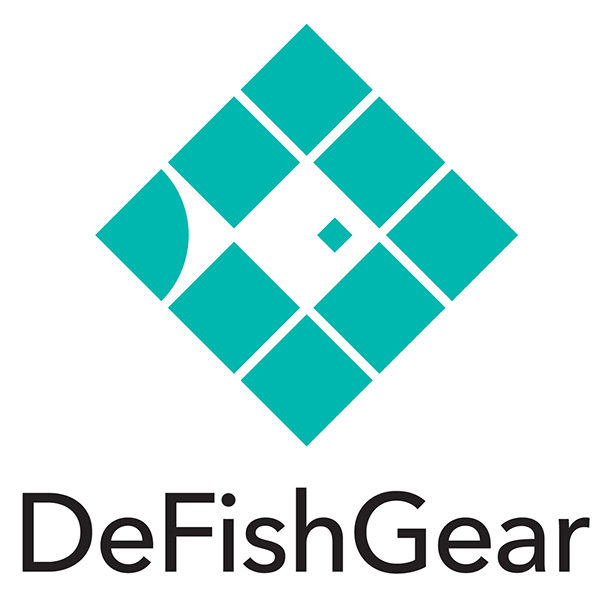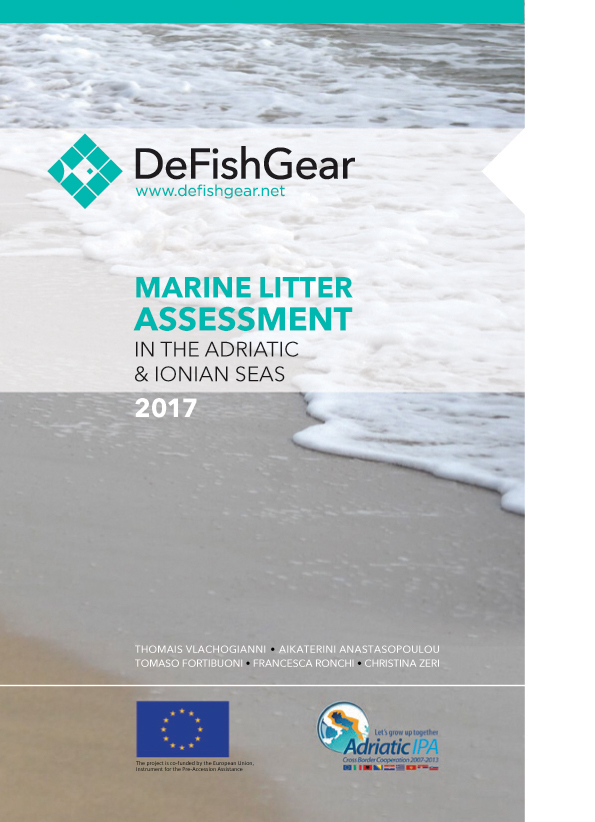The 3-year long DeFishGear was an IPA-Adriatic funded project aiming to facilitate the efforts of policy makers and stakeholders in effectively dealing with the issue of marine litter in the Adriatic MacroRegion, towards litter free coasts and sea. The DeFishGear activities were implemented by a multi-disciplinary team comprising academia, research institutes, national and local authorities and NGOs from all seven countries of the Adriatic Sea, reinforcing and strengthening cooperation and fostering joint and harmonized actions towards a litter-free Adriatic. MIO-ECSDE led the Work Package on Monitoring and Assessment of Marine Litter in the Adriatic and Ionian Seas.

The DeFishGear project aims to facilitate the efforts of policy makers and stakeholders in effectively dealing with the issue of marine litter in the Adriatic MacroRegion, towards litter free coasts and sea. Ultimately, the DeFishGear project will provide a strategic input to regional efforts in successfully achieving good environmental status in the Mediterranean Sea.
- Carrying out a comprehensive assessment of the status (amounts, composition, impacts) of marine litter (macro-litter & micro-litter) in the Adriatic through harmonized and coordinated monitoring activities ;
- Development of recommendations and policy options based on sound-scientific evidence and knowldge to meet regional and national objectives regarding marine litter (Marine Strategy Framework Directive, Regional Action Plan on Marine Litter Management in the Mediteranean, Ecosystem Approach, etc.).
- Establishment of a Regional Network of Experts on marine litter;
- Development of capacities to monitor marine litter in a harmonized way through reinforced exchange of experiences, techniques and know-how;
- Setting up of a system to collect and recycle derelict fishing gear and implemenatation of ‘fishing for litter’ activities, in an environment-friendly way;Awareness raising of different target groups (fishermen, policy makers, educational community, etc.) on the impacts of marine litter and the types of action they should undertake to effectively address this issue.
The Marine Litter Assessment in the Adriatic and Ionian Seas
 The DeFishGear marine litter assessment report presents the results of the one-year long marine litter surveys carried out in all seven countries sharing the Adriatic and Ionian Seas. More specifically: (i) 180 beach transects were surveyed in 31 locations, covering 32,200 m2 and extending over 18 km of coastline; (ii) 66 floating litter transects were conducted with small-scale vessels covering a distance of 415 km, while a total of 9,062 km were surveyed by observers on ferries; (iii) for the seafloor litter 11 locations were investigated with bottom trawl surveys and 121 hauls were performed, while 38 transects were performed in 10 locations with underwater visual surveys with scuba/snorkelling, thus covering a total area of 5.83 km2 of seafloor; (iv) for litter in biota 81 hauls were conducted and 614 fish individuals were studied. Find the full-text report here
The DeFishGear marine litter assessment report presents the results of the one-year long marine litter surveys carried out in all seven countries sharing the Adriatic and Ionian Seas. More specifically: (i) 180 beach transects were surveyed in 31 locations, covering 32,200 m2 and extending over 18 km of coastline; (ii) 66 floating litter transects were conducted with small-scale vessels covering a distance of 415 km, while a total of 9,062 km were surveyed by observers on ferries; (iii) for the seafloor litter 11 locations were investigated with bottom trawl surveys and 121 hauls were performed, while 38 transects were performed in 10 locations with underwater visual surveys with scuba/snorkelling, thus covering a total area of 5.83 km2 of seafloor; (iv) for litter in biota 81 hauls were conducted and 614 fish individuals were studied. Find the full-text report here
The Marine Litter Monitoring Methodologies
- Methodology for monitoring marine litter on beaches (macro debris >2.5 cm)
- Methodology for monitoring marine litter on the sea surface
- Methodology for monitoring marine litter on the seafloor – bottom trawl surveys
- Methodology for monitoring marine litter on the seafloor – scuba/snorkelling
- Methodology for monitoring macro- and micro-litter in biota
- Methodology for sampling plastic pellets for POPs determination
- Methodology for monitoring microplastics on the sea surface and in beach sediments
The Marine Litter Socioeconomic Implications Study
The DeFishGear project carried out a survey-based assessment of the socio-economic implications of marine litter in the Adriatic and Ionian macroregion. This is the first-ever effort aiming to investigate in a coordinated, consistent and comprehensive way the socio-economic implications of marine litter in the Adriatic-Ionian macroregion. In fact it is the first of its kind marine litter related study in the Mediterranean. Find the full-text report here
The DeFishGear Network for a litter-free Adriatic and Ionian coast and sea
Motivated by the successful cooperation accomplished within the project – the first sub-regional project dealing with the marine litter issue in the Adriatic-Ionian macroregion, establishing and piloting comprehensive, coordinated and harmonized marine litter monitoring throughout the region as well as marine litter related measures – the DeFishGear partners decided to further commit themselves to the fulfillment of a shared vision and form a Network for a Litter Free Adriatic and Ionian Coast and Sea. This network ensures that the contacts and working relationships developed during the project will be maintained and further developed through follow up, collective and collaborative projects and initiatives. Furthermore, it is expected to substantially contribute to efficiently and effectively achieving lasting positive impacts and changes via continuity, coherence and cross-fertilization among and between projects and/or initiatives dealing consecutively or in parallel on the marine litter issue in the region. Read more here
The DeFishGear GIS database
A purpose-built database developed within the scope of the project and publicly accessible at http://defishgear.izvrs.si/defishgearpublic. The DeFishGear database uses the “ArcGIS Server” software for spatial manipulation and the “Nukleus GIS” software for viewing environmental information and it is hosted by the Institute of Water of Slovenia.
The DeFishGear video tutorial on beach litter monitoring
Proper monitoring of our coasts and seas is an important contribution to keeping them litter-free. Therefore, MIO-ECSDE produced a video tutorial on how to monitor marine litter on beaches.
The DeFishGear e-learning module on marine litter monitoring
A self-paced distance learning module on how to monitor marine litter on beaches, the sea surface and the seafloor was designed to be comprehensive enough yet not time demanding so that any interested busy practitioner, administrator, professional, student or NGO staff member can enhance her/his skills on how to design and implement marine litter monitoring activities. It provides the necessary technical and scientific background to support the design and implementation of marine litter monitoring programmes within the framework of the EU Marine Strategy Framework Directive and the UNEP/MAP Regional Plan for Marine litter Management in the Mediterranean. The methodologies showcased have been pilot tested by the DeFishGear project and have been developed based on the ‘Guidance Document on Monitoring of Marine Litter in European Seas’ elaborated by the EU MSFD Technical Sub-Group on Marine Litter and the UNEP/MAP MEDPOL draft Monitoring Guidance Document on Ecological Objective 10: Marine Litter.
- Improved knowledge on the occurrence, amounts, sources and impacts (including socio-economic impacts) of marine litter (including microplastics) in the Adriatic;
- Harmonized marine litter monitoring activities in the Adriatic region and enhanced collaboration as a building block for future actions;
- Strengthened & reinforced science-policy interface to support the integration of sound science into policy and decision making in effectively tackling marine litter;
- Joint, coordinated and/or complementary schemes to manage human activities generating litter in the Adriatic Sea and strengthened implementation of relevant policy frameworks (MSFD, ICZM, ECAP, MSP, etc.)
- National Institute of Chemistry, Ljubljana, Slovenia (LEAD PARTNER)
Partners
- Italian National Institute for Environmental Protection and Research, Rome, Italy
- Ca’ Foscari University of Venice – Department of Philosophy and Cultural Heritage, Venice, Italy
- Mediterranean Consortium, Rome, Italy
- Regional Agency for Environmental Protection in the Emilia-Romagna region, Bologna, Italy
- Institute for water of the Republic of Slovenia, Ljubljana, Slovenia
- University of Nova Gorica, the Laboratory for Environmental Research, Nova Gorica, Slovenia
- Institute for Oceanography and Fisheries, Split, Croatia
- Hydro-Engineering Institute of the Faculty of Civil Engineering, Sarajevo, Bosnia and Herzegovina
- University of Montenegro, Institute of marine biology, Kotor, Montenegro
- Agricultural University of Tirana, Laboratory of Fisheries and Aquaculture, Tirana, Albania
- Regional Council of Lezha, Lezha, Albania
- Mediterranean Information Office for Environment, Culture and Sustainable Development, Athens, Greece
- Hellenic Centre for Marine Research , Anavyssos, Greece
- Public Institution RERA SD for coordination and development of Split Dalmatia County , Split, Croatia
- Euro-Mediterranean Centre on Climate Change , Lecce, Italy
Associate Partners
- PlasticsEurope AISBL, Brussels, Belgium
- Ministry for Agriculture and Environment, Ljubljana, Slovenia
- Italian Ministry of Environment, Land and Sea, Rome, Italy
- Croatian Environment Agency, Zagreb, Croatia
- Fishing League, Rome, Italy
- Agency for watershed of Adriatic Sea Mostar, Mostar, Bosnia and Herzegovina
Funding instrument: IPA Adriatic Cross-border Cooperation Programme
Theme: Improving marine, coastal and delta rivers environment by joint management in the Adriatic area.
Project duration: 1 November 2013 – 31 March 2016 (29 months)
Project budget: 5.353.765 €
- Level of completion 100%